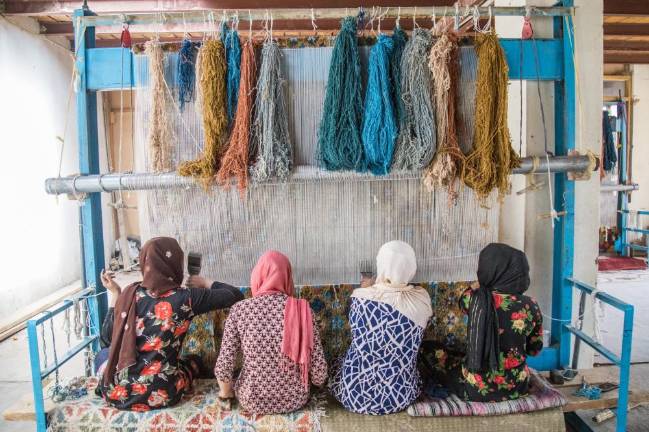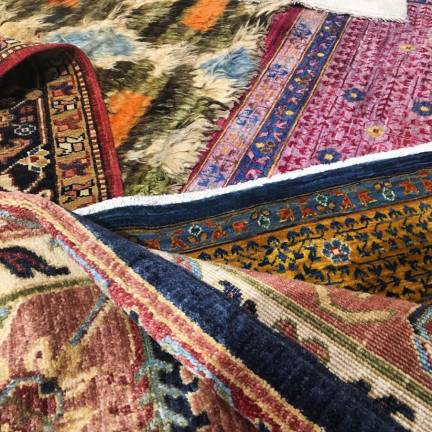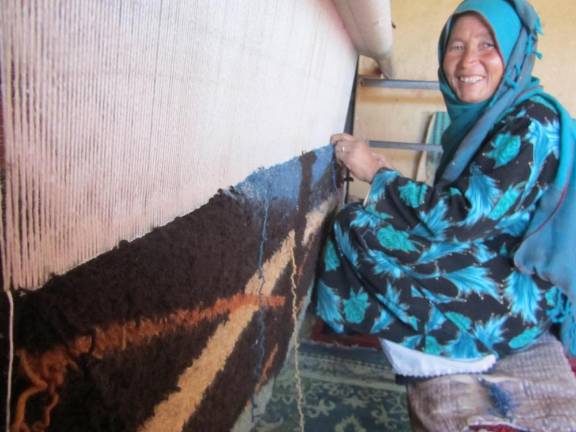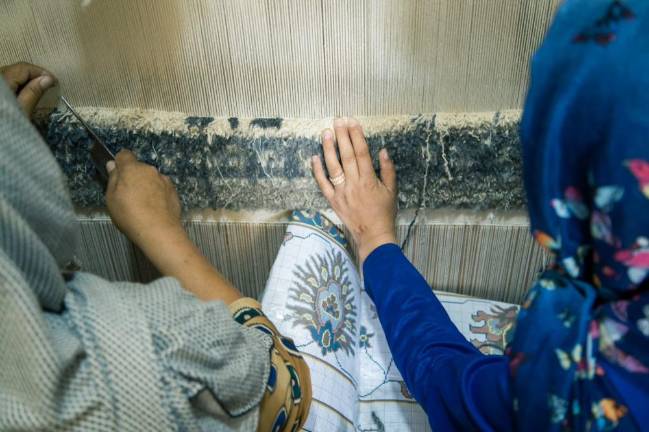The Carpet Whisperers
With backing from a former VP of ABC Carpet & Home, a story of empowering the carpet-weaving women of Afghanistan
A stunning array of more than a thousand richly-hued, hand-knotted rugs made in Afghanistan filled the fifth floor of the Metropolitan Pavilion in Chelsea. The four-day event was organized by the Kabul Carpet Export Company (KCEC), a civilian project funded by the U.S. Agency for International Development that aims to empower the women who weave these carpets in Afghanistan to own their businesses and take the reins.
Afghan rugs ooze quintessential luxury. Made from the highest quality wool, the carpets are dyed with a vibrant palette of fruits and herbs, sans chemicals, and are a favorite of interior designers and those with a taste for artsy decor. What is not apparent is the disheartening truth behind how these rugs are handwoven: women constricted to their homes in Afghanistan, bent over for months on end in squalid conditions, doped up on opium to withstand the toll on their bodies while painstakingly tying every knot into countless patterns. They are then excluded from the business end of things, rendered as invisible and denied any form of financial independence.
Since KCEC’s conception, an Afghan woman, Najlla Habibyar, 34, has led the effort to provide these weavers their rightful share of the income and access to business training, bringing sweeping change to the local cottage industry. “When we started the project we didn’t have any women manufacturers leading their business,” reflects Habibyar. “But now we are working with many women who are selling their own carpets. We want the money to go directly to them rather than going to a third party in the middle.”
Richard Ringrose, former Vice President of ABC Carpet & Home, founded KCEC in 2018 with fellow industry veterans Rob Leahy, Alex Zahir and Stephen Landrigan, working together as Impact Carpet Associates LLC. “I met Najlla in 2010, she was the Director of the Export Promotion Bureau for Afghanistan,” says Ringrose. “When we put this project together, we told Najlla, we really need you to come and run this organization for us.”
Seclusion and Exclusion
Afghanistan is a male-dominated country that practices seclusion or purdah, where women are socially restricted and not allowed any form of autonomy. “[Carpet-weaving] is an industry that is culturally accepted because women weave inside their homes, they don’t go outside and can take care of their families,” explains Habibyar, adding that while women have been given more access to education by the post-Taliban government, the idea of a woman owning a business is still a stretch in most provinces.
“Once the carpet is completed and taken from the room, the husband or male member of the family then takes it to the bazaar and sells it,” says Ringrose. “It is the country’s second largest industry and export, and it wouldn’t work if not for all the women who are involved.”
KCEC’s efforts to put power into the hands of the women who weave carpets is three-fold: one is a capacity-building stream that ensures a safer working environment, including face coverings that protect the women from the dust and wool when weaving, and executive training on the intricacies of finance, contract negotiation, customs and marketing strategies.
“We also provide loans and grants for companies to ensure they are able to [fund] carpet washing and finishing facilities,” says Habibyar. “Most of the time they do not have that facility and carpets were being smuggled to Pakistan to be finished, and they get 80% of the profit.”
Ringrose says this is how he got involved in the carpet industry in Afghanistan, from a report he presented to the Department of Defense in 2011 on the need for the construction of local finishing plants. “We built two 21st century carpet washing plants, one in Mazar-i-Sharif and the second one in Herat,” says Ringrose. “The result is a sort of ripple effect from there — now more and more carpet washing facilities are popping up all over the country. So the absolute need for merchandisers to ship their carpets to Pakistan is reducing.”
The third measure is opening e-commerce sales channels buffered by pop-up sales and exhibitions like the one in Chelsea. “At our last road show, which was in October 2019, we invited 15 [carpet manufacturers] from Afghanistan to attend the event, bring their merchandise in and gave them the opportunity to deal directly with the buying public,” says Ringrose. “It was a huge learning curve for them.”
While the weavers will not be able to attend the sale this year due to COVID restrictions, Zoom sessions are being made available. “We are [raising awareness] of who the manufacturers are so that buyers can buy more responsibly,” says Habibyar. “Our main model is to have Afghanistan carpet weavers recognized in the world.”
A Kaleidoscope of Culture
The true value of the carpets being sold at the exhibition are not only as an emblem of the indomitable creative spirit of Afghan women, but also an expression of justice and solidarity. Habibyar deems the avant-garde range being presented, like designs inspired by Afghan-born poet Rumi, as “a fusion of traditional design and modern art that appeals to different generations.”
Ringrose adds that prices are at a fraction of what it would be if bought through conventional routes. “We are accelerating the process,” he notes. “Instead of these carpets going to a wholesaler in Chicago who then sells some to a retailer in Los Angeles, these are going directly from the manufacturers, through KCEC, to the buying public.” The entire range of carpets is also shoppable online.
The Start of a New Era
Funding by USAID ends this year, but both Habibyar and Ringrose say that KCEC will continue to thrive from previous revenue and a continued relationship with international buyers. Ringrose says he will persevere in connecting local weavers with European companies that are commissioning bespoke carpets made to their design, colors and sizing.
“KCEC has become a self-sustaining, profitable Afghan-owned company that no longer requires donor funding,” says a USAID spokesperson. “Impact Carpets proposed this time frame and investment from USAID as a means to gain their independence as a viable local business.”
Habibyar revealed that moving forward, the project will be handed over to Oxus Group, an Afghan company that will continue to ensure women who weave carpets will earn an income on sales and exports: “What is important is that we have established trust with these women who weave carpets and are working together for the future.”



